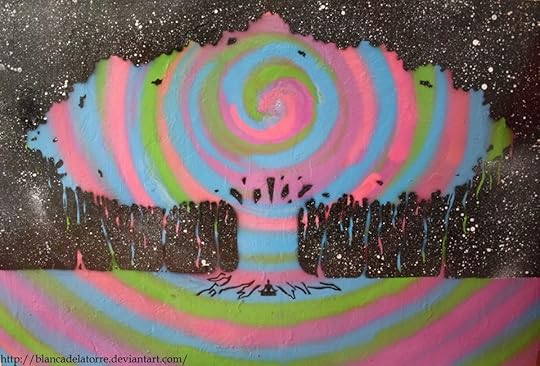Jim Palmer's Blog, page 67
July 19, 2013
5 ways the pop-Christian “Gospel” damages children
5 ways the pop-Christian “Gospel” damages children:
(1) Telling children that they are born into this world intrinsically bad, absent of inherent worth, and repulsive to God.
(2) Telling children that their sinfulness is so bad that it left God no choice but to brutalize, torture and kill his son.
(3) Telling children that there is nothing good inside of them and that they should not trust their thoughts and feelings.
(4) Using fear or shame as a means of binding children to certain beliefs or practices related to God.
(5) Teaching children that the rejection, hatred or diminishment of other human beings is an expression of devotion to God.


July 18, 2013
20 Ways to Deepen Your Spirituality
20 Ways to Deepen Your Spirituality:
1. Make peace with your religious past.
2. Take responsibility for your spiritual journey.
3. Dissolve the line between “sacred” and “secular”.
4. Listen to and trust your inner voice.
5. Look past the labels and differences, and relate to the deepest reality in other human beings.
6. Stop making your humanity wrong.
7. Don’t strive to achieve or build a persona around being an enlightened person or spiritually superior.
8. Become a geologian – exploring the rhythm and flow of life in relationship to the phenomena of the physical world.
9. Expand what it means to be “present” – explore your spiritual aura and energy.
10. Address the root of your suffering.
11. Awaken and live from your inner passion.
12. Explore the connection between spirituality and sexuality.
13. Expand your relational world beyond religious sub-culture.
14. Don’t create a new religion out of your latest discovery.
15. Assume every human being knows something you need to know.
16. Don’t latch onto the latest guru – learn from everybody but consider yourself to be your own guru.
17. Read something other than spiritual/religious books.
18. Explore a new outlet for creative expression.
19. Do something that brings you delight.
20. Explore the pleasure of human touch with your partner.


July 16, 2013
The mind is not the only way to know something.
Imagine a rose having self-awareness. With this self-awareness, imagine the rose taking ownership of itself, seeing itself as separate, different and special. Looking around with this self-awareness, there are times the rose feels superior and at other times inferior.
But what is the rose beyond on descriptions? What is the true essence of the rose? That’s a bit abstract and illusive, isn’t it? How would you even put into words – a rose (or anything) that is “beyond description”? What is rose-ness?
The ego is like a self-aware rose. It’s aware of itself and its personality. It takes ownership of having a “self,” and sees that self as separate, different and special. The ego looks around and feels the need to exert a sense of superiority, mainly to mask or bring some equilibrium to its feelings of inferiority.
The ego is not bad. It’s what allows each of us to have a human experience. But the ego is a product of the body and mind, and it cannot comprehend its true “self-ness,” which is not contained within and is beyond the body and mind. Your true essence is beyond description, just like “rose-ness.” The deepest truth of who you are is not comprehensible to the ego and is not contained within the body or mind.
We walk away from conversations like this because it feels too abstract and elusive. The part that wants to walk away is your ego. It wants no part of this conversation. Your ego likes the idea of the “self” being that individual/separate/special personality. The ego is threatened by the idea of a “self-ness” that is bigger than its notion of its individualized body/mind self. The ego is threatened by anything it can figure out on a mind/body level.
The truth is that you are something beyond your body and mind. You have to know this. Just because your mind can’t figure out what that is, doesn’t matter. There are other ways to know things other than the mind.
The mind is not the only way to know something. There is also intuitive knowing or tacit understanding. This kind of knowing goes like this:
I know it
I don’t know why I know it
I know it as more certain than anything I am certain of
It is inexpressible
This intuitive knowing or tacit understanding is the way we know God, truth, our deepest selves and the true nature of all things. All of these are beyond the reach of the mind.


July 14, 2013
Look, let God be God.
God is inconceivable and incomprehensible. The idea that the doctrine of the Trinity explains God is absurd. God is one reality but we see God through different perspectives. Seeing God through the perspective of being the father, or through the perspective of being the son, or through the perspective of being spirit is not seeing three different Gods, it is seeing God in three different ways, and those aren’t even the only three ways to see God.
God is inconceivable and incomprehensible. But our mind is not going to leave well enough alone. It will not accept this and therefore it will seek to distill God down into one form or another, creating a box for God. The doctrine of the Trinity is one way we have tried to indicate God by distilling the inconceivable into the conceivable. This isn’t necessarily bad or wrong, and can be meaningful and useful as long as we know that God is not limited by any notion we may have of God.
I have found that many people are drawn to the notion of a personal God with whom they have personal relationship. You might say that this is seeing God through the perspective of being the father. But does this mean that we must distill God from the inconceivable to the conceivable by anthropomorphizing God or turning God into a person? Do we have to limit God by putting God in the person box?
Consider that one of the reasons why people find meaning in seeing God through the perspective of a loving father is because of the attributes associated with this such as love, caring, understanding, personal closeness, gentleness, protection, wisdom, acceptance, etc. These attributes are part of the underlying, unchanging, fundamental essence of God, regardless of whatever perspective of God we might be particularly attached to. I think God allows for all kinds of different perspectives for our benefit. God allows many different ways of accessing what it inconceivable for our benefit. And yet, we cannot put God in any box, even the father/person box.
We typically want God to be who we want God to be. We can’t force God into our lives, even as a person. God cannot be contained within that or any box. On the other hand, God is wanting to transform our lives with the reality and Truth of who God is, which is unfathomably more than our highest and best constructed notion of God. In order to grow, we have to let God be God. And even though there is nothing wrong with the perspectives of God that we find most meaningful, we cannot hold them too tightly or force God into our concept.
God is inconceivable and incomprehensible. But our mind will have none of this. Instead we insist on distilling God down to the conceivable. We create boxes for God – blue boxes, red boxes, yellow boxes, square boxes, rectangular boxes, long boxes, and then we argue over who has the best box. It can get juvenile – “My box is better than your box; nanny nanny boo boo!” In can also get deadly, as in the Crusades.
Look, let God be God. Quit prescribing God to everyone else. It’s okay to approach and connect with God in ways that are meaningful to you, but don’t put God in a box.


July 13, 2013
Jesus turned everything upside down.
Jesus turned everything upside down. He desacralized everything – times, places, rituals, altars, hierarchies, traditions. In there place, he ascribed dignity and authority to the human being – ordinary men and women who bear God’s image. He put everything back under the feet of the human ones. Religion – Law, Scripture, everything – must serve them rather than be served by them.
Jesus did not assume a religious persona. He did not advocate religious fasting or support the temple sacrifices. He did not baptize. He did not preach from the Hebrew Bible, although he used it creatively to serve his purposes. He was dismissive of long or repetitious prayers. He set aside the purity code in regard to food, the washing of hands, interaction with women and the touching of lepers. He declared his authority over the Sabbath, and by implication, the whole of the Torah or sacred Scriptures.
Jesus honored the spirit of God wherever it was manifested, but he did not align himself with the religious mentality that sought to legislate the divine or God. And all this he did in solidarity with humankind because he was the son of Adam


July 12, 2013
God was God and Truth was Truth before there was a Bible
There are at least 14 Factors that influence what one comes up with in the Bible:
1. Your views regarding the inspiration of Scripture.
2. Whether you would favor a literal or figurative interpretation of a given passage.
3. Your knowledge and awareness of other “related” Scriptures dealing with the same issue, including the immediate context and the broader context of the entire body of Scripture.
4. Your knowledge and understanding of the background and
motivation of the writer.
5. The way in which a given interpretation fits into your over-all
theological belief system.
6. Your level of understanding of the original language in which the
text was written.
7. The various interpretations and commentaries to which you have already been exposed.
8. The ways in which you process information. Some people tend to emphasize reason and logic, while others depend more on personal experiences and intuition.
9. The degree to which you are willing to accept logical inconsistencies as part of your belief system.
10. Your willingness to change your views in the light of new
information.
11. The degree to which you are satisfied with your current views.
12. The amount of time you are willing to devote to your theological study and inquiry.
13. The unwillingness to consider alternative interpretations that diverge from your religious tradition.
14. Your pre-existing views, which has been conditioned by many different life experiences, circumstances and relationships.
Based on the above variables, does it surprise anyone that there are many different ways the Bible is interpreted? This is especially problematic because many people view the Bible as something to be “right about.”
The only absolute truth is God or truth itself, and our best interpretations of the Bible are only an approximation of it. God was God and Truth was Truth before there was a Bible and will continue to be after the Bible is no more. The Bible is not a theological landing strip for a particular belief system about God, but a spiritual launching pad setting us free to explore and enjoy ever-deepening and ever-widening dimensions of life, love, peace, goodness, beauty, and freedom.
Once I realized that the point of the Bible was not to create a belief system ABOUT God the Bible became an invaluable resource for my journey WITH God.


July 11, 2013
There will be waves. That’s just what happens.
On the surface of the ocean, a huge tanker is crashing through the waves, disturbing the ocean’s surface. 7 miles down, the ocean is still and quiescent. A few interesting things to notice:
1. The disturbed water on the surface, and the quiescent, still water deep below are the same water.
2. The disturbed water on the surface has no effect on the water deep below.
3. Taking the ocean as how it appears on the surface in the wake of the tanker, it appears that the ocean is a rough and raging reality. And though this same ocean is quiescent and still deep below, that part remains hidden from our eyes and ears.
The surface of life appears to be like a huge tanker crashing through ocean waves. On the surface, life is not a smooth, placid surface. Right? There’s difficulty, disturbance, friction, the unexpected, conflict, change – in any given day there are all kinds of situations, conditions, and circumstances that makes life a rough ride. You have a body and mind (both of which change and are characterized by impermanence) interacting with a world that is characterized by change and impermanence, which means waves… lots of them. That’s never going to change. When there is a body and mind interacting in the human world… there will be waves!
However, what you don’t see is that 7 miles down… at the center of yourself, at the center of life, at the center of the world, at the center of all things… is a deep, still and quiescent reality. It’s not an object, or something you can point to, or put in a bottle. It is inconceivable and inexpressible. Many people use the word “God” to identify that reality. It is the underlying, unchanging and fundamental essence of all things, including yourself.
The important thing to see is that the water disturbed on the surface is the same quiescent water that is deep below. Right? Thinking of the ocean, the water in the surface waves is no different than the quiescent water deep below. It’s all the same water.
People are wanting to find peace and happiness in life by trying to make the surface of their lives smooth, placid, and undisturbed. We seek pleasure, and avoid pain. We try to engineer some set of life circumstances that we imagine will being peace and happiness. We attend conferences and seminars, and read books, in hopes of finding some new and improved way of eliminating the waves and achieving a smooth, disturbance-free life. Ain’t gonna happen. Ever! There will be waves. That’s just what happens. That’s the way it is.
But here’s the good news. It’s not necessary to have a wave-less life to have peace and happiness. Why? Because true peace and well-being is not the result of achieving a smooth, placid, wave-less surface. True peace and happiness stems from understanding how it works or recognizing the way things really are. Things are not as they appear. It appears that life is one crashing wave after another. But that’s not really the way things are. The way it really is involves recognizing that this same water is actually still and quiescent at the deepest level.
The surface is always going to manifest in waves because that’s just what happens when a body and mind encounters a world of change and impermanence. And yet beneath the surface, reality is still and quiescent. You don’t have to quiet the waves on the surface to create the stillness and quiescence. It is already there.
Jesus did not say, “Leave this world and find the Kingdom of God.” He did not say, “When you die and go to Heaven, you will enter the Kingdom of God.” Jesus said the Kingdom of God has come and is here now. How can that be true? It’s true because one does not have to calm the waves on the surface in order to know the still and quiescent reality below. Life is not separate from God. God is not separate from life… this life… now. It’s the same water. The only problem is that we take the appearance of things as the way they really are.


July 10, 2013
What if we started asking questions…
What if we shifted the framework away from:
This Religion versus That Religion
This Belief System versus That Belief System
This God versus that God
This Creed versus That Creed
This Jesus versus That Buddha versus This Mohammad versus That Abraham, versus… etc…
What if we stopped asking questions like:
What is your religion?
What are you beliefs?
What is your doctrine?
Where do you go to church?
What if we started asking questions more like:
Are you free from suffering?
Do you know the unchanging, underlying and fundamental essence and nature of yourself, and all things?
Do you know the path to lasting happiness?
Have you buried the false notion of separation?
Do you see God in all things and all people?
Are you participating in the liberation of all beings?
Are you an instrument of compassion, wisdom, and love?
Are you being present in the moment?
Are you living life skilfully?
Do you know the peace beyond all comprehension?


July 8, 2013
The language of transformation often works against us.
The language of transformation often works against us. We sometimes speak of “spiritual growth.” The idea of “growth” implies that spirituality is a process of stages in which we make improvements or progress toward becoming something more or different than what we are right now. Consider the possibility that you were born out of the image, likeness and being of God. The image, likeness and being of God is the underlying, unchanging, and fundamental essence of who you are. The truth is that there is nothing wrong with you the way you are. You cannot be improved upon, and there is never any diminishment of who you are. There is nothing more secure than your true Self and it is never threatened.
Do you suppose that if you choose eggs over oatmeal for breakfast this morning that it will cause the sun to shop shining? Ridiculous, right? The two things are entirely unrelated. It’s the same with your true Self – it is undisturbed and unaffected by anything outside of it, including whatever you do or don’t do.
Jesus’ primary message was NOT, “Try harder; the kingdom of God is here.” Nor was it, “You have a lot of growing to do before you can ever expect to experience God’s kingdom.” Instead, Jesus said, “Repent, for the kingdom of God is here.” The word “repent” (metanoia) means to change your mind or to see things in a way you have never seen them before.
Transformation is not a growth process of improvement and advancement that happens in stages. Transformation is stopping right now and seeing things as they really are… seeing yourself as you really are.


July 5, 2013
“Jesus said, “Small is the gate and narrow the road that leads to life, and only a few find it.”
“Jesus said, “Small is the gate and narrow the road that leads to life, and only a few find it.”
Here are three reasons why I have discovered this to be so (and three thoughts on what you can do differently):
1. We want to have it our way.
Remember that old Burger King motto – “have it your way”? It is often the unspoken motto of our spiritual journey and pursuit of truth. We want to know the truth on our terms. We have conditions like:
a. It has to nicely fit in, complement, and support our current beliefs and understandings.
b. It must provide a sense of certainty and security.
c. It must not disturb our lives too much so as to to make us uncomfortable, or push us too far out of our comfort zone.
*To do things differently, decide that you will not allow yourself to deter you from your path of seeking truth by having conditions upon it.
2. We want to figure it out with, in, and through our minds.
Jesus spoke of a peace not of this world and beyond comprehension. He could have expanded this to include any and all spiritual truth. The true nature of all things is beyond the reaches of the mind. The truth is infinitely beyond the highest point the human intellect is possible of reaching. And yet, at almost every turn the mind is like the tail wagging the dog – we are continuously trying to satisfy our minds in our pursuit of truth.
*To do things differently, do not define, conceptualize, or theorize assertions of what the truth is. Only divest yourself from those notions or ways that you have found that don’t work. Refuse the temptation to conceptualize a new and better idea to replace it.
3. We imagine that what we seek is outside ourselves.
Peace, joy, well-being, freedom are not objects, experiences, circumstances or states of being to be added, achieved or attained. When a person is transformed, awakened or enlightened, nothing is changed or added. What happens is a turning around in the deepest seat of consciousness. This is what Jesus meant when he said, “Repent, for the kingdom of God has come.” The word “repent” (Greek word, metanoia) literally means “beyond the mind.” It’s the idea of stretching or pushing beyond the boundaries with which we normally process reality. It’s a turning toward and recognition of the true nature of things beyond the knowledge or intellect of the mind. In other words, Jesus was saying, “The kingdom of God has come. It is not out there somewhere to achieve or attain, it is here right now, it is inside of you, and is you. Open the eyes of your heart and see it is true, see the way things truly are. Let your true self see it, turn toward it and know it to be so.”
When Jesus said, “I AM the truth,” Jesus was implying that one does not have to look any further than BEING to access and know the truth. Jesus calls us family because each of us were born out of the image, likeness and BEING of God. As Rumi expressed it, “We are not a drop in the ocean; we are the ocean in a drop.”
*To do things differently, consider that the world is not as it appears where all things and individualized into separate forms, and independent and detached from one another. Look closer and deeper, and see how all things are expressions of one reality of which you are a part and connected.
So you see, the path that leads to life is narrow and few find it. Is there any surprise it would be this way just given the few things I have experienced and shared?”
- Jim Palmer, Notes from (Over) the Edge















